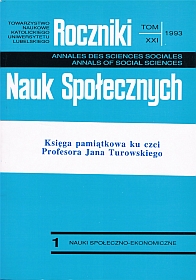Godność osoby ludzkiej jako wartość absolutna
Abstrakt
The author analyzes the relations between various values and he establishes their ultimate criterion and hierarchy. He is of opinion that an incorrectly established criterion of values and an incorrectly constructed and accepted hierarchy of them leads to what Carl Schmitt called − in reference to Nikolai Hartman − the tyranny of value (die Tyrannai der Werte).
The author critically appraises the views of those who maintain that there is a conflict, a dilemma or tension between freedom and equality (justice). He shows that the dilemma is not immanent in the mentioned values but in the incorrect conception of freedom as presented by the liberals on the one hand, and in the erroneous (objective) conception of equality as explicated by the Marxists. In fact the dilemma occurs between those philosophical-social trends. Secondly, the dilemma always appears where these values are confronted with each other in the wrong way and separated from other values − especially from the truth about dignity of the human person. And thirdly, in all the views in which it is admitted that there is a conflict between freedom and equality there is a „methodological” error. It consists in the fact that the conflict of interests of individuals or social groups is reduced to tensions between humanistic values − freedom and equality. Egoistic interests are sought to be hidden behind the screen of the values. Freedom without equality (justice) and the truth about dignity of the human person becomes freedom of élites whereas it is a tyrannizing value for most other classes. The situation is analogous in the case of equality without freedom and the truth dignity of the person.
The author shows that dignity of the person is the central, absolute value, as the person is related to the Absolute; it is created in God's image and is redeemed by Christ (supernatural dignity). The author also writes about natural dignity to which the mind, conscience and freedom point. All other values, even objective and universal ones − moral norms and human rights − have an adpersonal (relative) character. Accepting freedom or equality as an absolute value without the truth about dignity of the human person lies at the foundations of all forms of totalitarian systems.
According to the author dignity of the human person creates an obligation. He formulates the rule: persona est affirmanda propter se ipsam. He shows that dignity of the human person integrates nations as well as the international system of human rights. In the introduction to the United Nations Chart belief in dignity and value of the human person is expressed. In the introductions to both Human Rights Pacts (1966) it is recognized that human rights follow from the inborn dignity of the human person. The notion of dignity of the human person is also found in the constitutions of many countries, e.g. of West Germany (1949). In West German commentaries it is said that dignity of the human person (Art. 1 p. 1) is the highest value (der oberste Wert), it is the norm of norms (Norm der Normen).
Dignity of the human person should be − as it not always is − the criterion of all programs and social economic and political systems.
Copyright (c) 1993 Roczniki Nauk Społecznych

Utwór dostępny jest na licencji Creative Commons Uznanie autorstwa – Użycie niekomercyjne – Bez utworów zależnych 4.0 Międzynarodowe.


